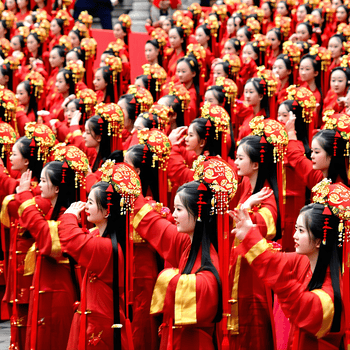
Attention all employers and employees! Brace yourselves, because China’s new maternity leave policy is just around the corner. Starting in 2023, expectant mothers will be entitled to up to 15 weeks of paid leave – that’s three whole months off work!
But what does this mean for businesses? How will this impact productivity and profitability? And what about the moms-to-be themselves?
In this blog post, we’ll explore the ins and outs of China’s revolutionary new maternity leave policy and its implications for both sides. So sit tight as we dive into a topic that will affect millions of workers across the nation.

Introduction: Overview of China’s New Maternity Leave Policy
In 2015, the Chinese government amended its Labor Contract Law to grant new mothers a minimum of 14 weeks of paid leave. The amendment also requires that employers continue to pay social insurance premiums for employees on maternity leave. Prior to the change, new mothers were only entitled to six weeks of paid leave, with no guarantee that their jobs would still be available upon their return. The new policy is a significant improvement for working mothers in China and will have a significant impact on employers and employees alike.
For employers, the biggest change will be the financial impact of the increased maternity leave. In addition to continuing to pay social insurance premiums for employees on leave, employers will now also be required to provide 14 weeks of paid leave. This will undoubtedly lead to an increase in labor costs for many companies. However, it is important to note that the increased cost of maternity leave is offset by the fact that new mothers will now be more likely to return to work after their leave, as opposed to quitting or taking extended periods of unpaid leave. This ultimately saves companies money in the long run by reducing turnover and increasing productivity.
For employees, the new policy means greater job security and income during maternity leave. Before the change, many women were reluctant to take maternity leave because they feared losing their jobs or being demoted upon their return. The new law provides greater protections for pregnant women and new mothers, ensuring that they can take the time they need without fear of reprisal from their employers.
Impact on Employers & Employees
When it comes to maternity leave, China has been lagging behind other countries for years. But a new policy announced earlier this year is set to change that, giving mothers up to 14 weeks of paid leave. The policy will come into effect in January 2020, and while it’s a step in the right direction, there are still some concerns about how it will affect employers and employees.
For employers, the biggest concern is likely the cost of providing paid maternity leave. The new policy requires companies to provide 100% of a mother’s salary during her leave, which could be a significant expense for small businesses. There are also worries about how the policy will affect productivity and morale. If mothers are taking extended leaves, it could create staffing challenges and disruptions in the workplace.
Employees, on the other hand, are generally supportive of the new policy. Maternity leave is an important benefit that can help mothers bond with their babies and recover from childbirth. It can also give them time to adjust to their new roles as parents. However, there are some concerns about how the policy will be implemented in practice. For example, it’s not clear how mothers will be able to take advantage of the full 14 weeks if they’re also working full-time.
Overall, the new maternity leave policy is a positive development for both employers and employees in China. It’s an important step towards supporting families and improving work-life balance in the country.
Benefits for Employees
In China, the new maternity leave policy will offer more benefits for employees. These benefits include:
- More paid time off: Employees will now be entitled to 98 days of paid maternity leave, up from the previous 60 days. This is a significant increase that will give new mothers more time to recover and bond with their babies.
- Better job security: The policy includes a provision that prohibits employers from firing women who take maternity leave. This will give peace of mind to new mothers who were previously worried about losing their jobs if they took time off to have a baby.
- More flexible work arrangements: The policy allows for greater flexibility in work arrangements so that new mothers can better balance their work and family responsibilities. For example, employers must allow new mothers to reduce their hours or work from home if they wish.
These are just some of the ways that the new maternity leave policy will benefit employees in China. It is clear that this is a positive step forward for working mothers in the country.
Challenges for Employers
The first challenge for employers is that they may need to re-evaluate their current maternity leave policies. The new policy is likely to result in more employees taking maternity leave, which could put a strain on businesses. Employers will need to decide whether to offer additional paid leave or make other arrangements such as hiring temporary staff.
Another challenge for employers is that the new policy could create a disparity between those who are able to take advantage of it and those who are not. For example, employees who work for companies with better maternity leave policies may be more likely to take maternity leave than those at companies with less generous policies. This could lead to a situation where some employees feel like they are being treated unfairly.
Employers will also need to be aware of the potential impact of the new policy on their workplace culture. In particular, they may need to consider how to support employees who are returning from maternity leave, and how to foster an inclusive culture that values all employees’ contributions.
How to Prepare for the Changes?
Assuming your company has employees based in China, it is important to be aware of the recent changes to the country’s maternity leave policy and how it may affect your business.
Here are some things to keep in mind:
- The new policy entitles mothers to 14 weeks of paid leave, up from the previous 12 weeks.
- Fathers are also now entitled to take up to two weeks of paid paternity leave.
- Companies with over 25 employees must provide a nursing room for new mothers.
- Employers must continue to pay social insurance for employees on maternity leave.
- Employees who take advantage of the new policy cannot be fired or demoted within one year of returning to work.
The most immediate impact of the new policy will be on businesses’ bottom lines, as they will now be required to provide more paid time off for parents. However, there are also potential long-term benefits for companies that invest in supporting their employees during this crucial time in their lives. Studies have shown that parental leave can lead to increased productivity, lower turnover rates, and improved morale among employees.
International Comparisons
In recent years, China has made great strides in expanding its maternity leave policy. The new policy, which went into effect on January 1, 2020, guarantees 14 weeks of paid leave for mothers and 18 weeks for those who are pregnant with their second child. This is a significant increase from the previous policy, which only granted eight weeks of paid leave to mothers.
The new policy is generous by international standards. In the United States, for example, the Family and Medical Leave Act (FMLA) provides up to 12 weeks of unpaid leave for mothers. And while some states have adopted additional paid leave policies, the majority of American workers do not have access to any form of paid parental leave.
In China, the new maternity leave policy will undoubtedly have a positive impact on working mothers and their families. However, it remains to be seen how employers will adjust to the increased costs associated with the policy. Some companies may choose to offset these costs by reducing other benefits or increasing salaries. Others may decide to pass the costs on to consumers in the form of higher prices. But regardless of how businesses respond, the new policy is a step in the right direction for Chinese working mothers.
Conclusion
China’s new maternity leave policy is an important step forward in the country’s commitment to supporting and protecting working mothers. It will offer employees greater peace of mind knowing that they have legal protection when it comes to taking maternity leave, while employers can also benefit from better employee retention and satisfaction. In the next few years, we may see more companies offering extended parental leaves or even paid family holidays as a result of this law change. Ultimately, with this new legislation in place by 2023, both employers and employees stand to gain considerable benefits for their respective families and work lives.



